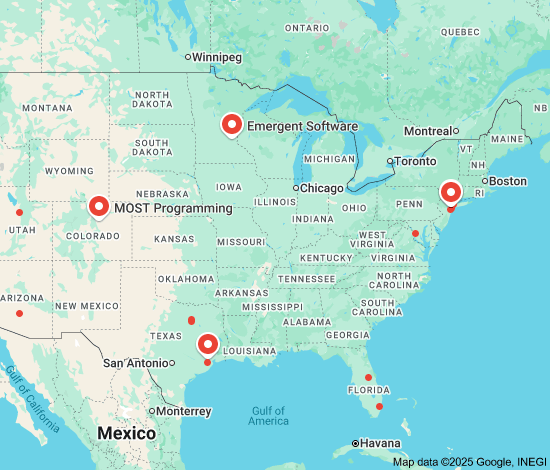Empowering Innovation: The Role of Software Development Firms in Modern Technology
The Role of Software Development Firms in Today’s Digital World
In today’s fast-paced digital landscape, software development firms play a crucial role in shaping the technological advancements that drive businesses and industries forward. These firms are at the forefront of creating innovative software solutions that cater to a wide range of needs and requirements.
Services Offered by Software Development Firms
Software development firms offer a diverse array of services to meet the demands of their clients. Some common services include:
- Custom Software Development: Tailored solutions designed to address specific business needs.
- Mobile App Development: Creating mobile applications for various platforms such as iOS and Android.
- Web Development: Building responsive and dynamic websites for businesses.
- Software Maintenance and Support: Ensuring that software systems remain functional and up-to-date.
- Quality Assurance and Testing: Conducting rigorous testing to ensure the reliability and performance of software products.
The Impact of Software Development Firms
Software development firms have a profound impact on businesses across all industries. By leveraging cutting-edge technologies and best practices, these firms help organizations streamline their operations, improve efficiency, enhance customer experiences, and stay competitive in the digital marketplace.
The Future of Software Development Firms
As technology continues to evolve at a rapid pace, software development firms must adapt to meet the changing needs of their clients. Embracing emerging technologies such as artificial intelligence, blockchain, and Internet of Things (IoT) will be key to staying relevant and delivering innovative solutions in the future.
In conclusion, software development firms are essential partners for businesses looking to harness the power of technology to drive growth and success. Their expertise, creativity, and dedication play a vital role in shaping the digital landscape and driving innovation across industries.
9 Advantages of Partnering with Software Development Firms: Expertise, Innovation, and Security
- Expertise in cutting-edge technologies
- Customized solutions tailored to specific business needs
- Access to a diverse pool of skilled professionals
- Efficient project management and timely delivery
- Continuous support and maintenance services
- Quality assurance and rigorous testing processes
- Innovative approaches to problem-solving
- Scalable solutions that can grow with your business
- Enhanced security measures to protect sensitive data
Challenges Faced by Software Development Firms: Costs, Delays, Communication, Dependencies, Security, and Talent Retention
- High costs associated with custom software development projects.
- Potential delays in project timelines due to unforeseen challenges or changes in requirements.
- Risk of miscommunication between clients and developers leading to misunderstandings or errors in the final product.
- Dependency on external vendors for specialized skills or technologies that may result in coordination issues.
- Security vulnerabilities in software products if proper measures are not implemented during development.
- Difficulty in finding and retaining top talent, leading to resource constraints and potential project delays.
Expertise in cutting-edge technologies
Software development firms bring a valuable pro to the table with their expertise in cutting-edge technologies. By staying abreast of the latest advancements in the tech industry, these firms are able to offer innovative solutions that leverage emerging technologies to meet the evolving needs of their clients. Their deep understanding and proficiency in utilizing cutting-edge tools and frameworks enable them to develop high-quality software products that are not only efficient and scalable but also future-proof, ensuring that their clients stay ahead of the curve in today’s rapidly changing digital landscape.
Customized solutions tailored to specific business needs
Software development firms offer a valuable pro by providing customized solutions tailored to specific business needs. By understanding the unique requirements and goals of each client, these firms can develop software solutions that address specific challenges and enhance operational efficiency. This personalized approach ensures that businesses receive tailored applications that align perfectly with their workflows, resulting in increased productivity, improved performance, and a competitive edge in the market. Customized solutions from software development firms empower businesses to optimize their processes and achieve their strategic objectives effectively.
Access to a diverse pool of skilled professionals
Software development firms offer a significant advantage through access to a diverse pool of skilled professionals. By tapping into a team with varied expertise and experience, these firms can deliver high-quality solutions tailored to meet the specific needs of their clients. This diverse talent pool not only brings a range of technical skills but also fosters creativity, innovation, and collaboration, ultimately enhancing the overall quality and effectiveness of the software development process.
Efficient project management and timely delivery
Efficient project management and timely delivery are key advantages of software development firms. By employing skilled project managers and utilizing proven methodologies, these firms ensure that projects are well-organized, progress smoothly, and meet deadlines. This approach not only enhances productivity but also instills confidence in clients by consistently delivering high-quality software solutions on time. Effective project management practices enable software development firms to optimize resources, mitigate risks, and maintain clear communication throughout the development process, ultimately leading to successful and timely project completion.
Continuous support and maintenance services
Continuous support and maintenance services offered by software development firms are a valuable asset to businesses seeking to ensure the optimal performance and longevity of their software systems. By providing ongoing support, including troubleshooting, updates, and enhancements, these firms help clients address issues promptly, improve system reliability, and adapt to changing business needs. This proactive approach not only minimizes downtime but also maximizes the return on investment in software solutions, ultimately contributing to long-term success and efficiency for organizations.
Quality assurance and rigorous testing processes
Quality assurance and rigorous testing processes are a key advantage offered by software development firms. By implementing thorough testing protocols, these firms ensure that the software products they deliver are of the highest quality and meet the specified requirements. Through meticulous testing, potential bugs and issues can be identified and addressed early in the development process, resulting in more reliable and stable software solutions for clients. This commitment to quality assurance not only enhances the overall user experience but also instills confidence in the reliability and performance of the software developed by these firms.
Innovative approaches to problem-solving
Software development firms excel in their innovative approaches to problem-solving, consistently pushing the boundaries of what is possible in the digital realm. By leveraging cutting-edge technologies and creative thinking, these firms are able to tackle complex challenges with unique and effective solutions. Their ability to think outside the box and adapt to ever-changing technological landscapes allows them to deliver tailor-made software products that not only meet but exceed client expectations. This pro sets software development firms apart as invaluable partners for businesses seeking forward-thinking solutions to propel their growth and success.
Scalable solutions that can grow with your business
Software development firms offer a significant advantage with their ability to provide scalable solutions that can expand in tandem with your business growth. This pro ensures that the software systems and applications developed by these firms are designed to accommodate increasing demands and evolving needs as your business expands. Scalability allows for seamless integration of new features, increased user loads, and enhanced functionality without the need for a complete overhaul of the existing software infrastructure. By partnering with a software development firm that offers scalable solutions, businesses can future-proof their technology investments and adapt to changing market dynamics with ease.
Enhanced security measures to protect sensitive data
Software development firms offer enhanced security measures to protect sensitive data, ensuring the confidentiality and integrity of valuable information. By implementing robust encryption protocols, access controls, and regular security audits, these firms help safeguard against potential cyber threats and unauthorized access. This proactive approach to security not only instills trust in clients but also demonstrates a commitment to maintaining the highest standards of data protection in an increasingly interconnected digital world.
High costs associated with custom software development projects.
The con of software development firms often lies in the high costs associated with custom software development projects. Tailoring software solutions to meet specific business needs can require extensive time, resources, and expertise, leading to significant financial investments. For many organizations, especially small businesses and startups, the upfront costs of custom software development can be prohibitive and may pose a challenge in budget allocation. Balancing the need for tailored solutions with budget constraints is a common dilemma faced by businesses when considering engaging software development firms for custom projects.
Potential delays in project timelines due to unforeseen challenges or changes in requirements.
Potential delays in project timelines due to unforeseen challenges or changes in requirements can be a significant con of software development firms. Despite meticulous planning and project management, unexpected issues or shifts in client needs can arise during the development process, leading to delays in project delivery. These delays not only impact the timeline but can also result in increased costs and frustration for both the software development firm and the client. Effective communication, flexibility, and proactive problem-solving are essential to mitigate these challenges and ensure successful project completion within a reasonable timeframe.
Risk of miscommunication between clients and developers leading to misunderstandings or errors in the final product.
One significant drawback of software development firms is the inherent risk of miscommunication between clients and developers, which can result in misunderstandings or errors in the final product. When there is a lack of clear and effective communication channels, crucial requirements may be misinterpreted, leading to discrepancies between what the client expects and what the developers deliver. This can ultimately impact the quality, functionality, and usability of the software product, potentially causing delays, rework, or dissatisfaction on both ends. It underscores the importance of establishing robust communication protocols and fostering transparent dialogue throughout the development process to mitigate such risks and ensure successful project outcomes.
Dependency on external vendors for specialized skills or technologies that may result in coordination issues.
One significant drawback of software development firms is their reliance on external vendors for specialized skills or technologies, which can lead to coordination issues. When a firm lacks certain expertise in-house and needs to outsource specific tasks to external vendors, there is a risk of miscommunication, delays, or inconsistencies in the development process. This dependency on third-party vendors for critical components can sometimes create challenges in aligning project timelines, quality standards, and overall project goals, potentially impacting the efficiency and effectiveness of the software development process.
Security vulnerabilities in software products if proper measures are not implemented during development.
Security vulnerabilities in software products can pose a significant risk if proper measures are not implemented during development. Software development firms must prioritize security at every stage of the development process to mitigate the potential threats that could compromise the integrity and confidentiality of sensitive data. Failure to address security concerns effectively can lead to data breaches, unauthorized access, and other cyber threats that can have far-reaching consequences for both the software firm and its clients. It is essential for software development firms to invest in robust security practices and stay vigilant in identifying and addressing vulnerabilities to ensure the safety and protection of their products and users.
Difficulty in finding and retaining top talent, leading to resource constraints and potential project delays.
One significant challenge faced by software development firms is the difficulty in finding and retaining top talent. The competitive nature of the industry, coupled with the high demand for skilled professionals, often results in resource constraints and potential project delays. Recruiting and retaining top talent require significant time and investment, and turnover can disrupt project continuity and team dynamics. This con underscores the importance of effective talent management strategies and creating a work environment that fosters employee growth and satisfaction to mitigate these challenges.







